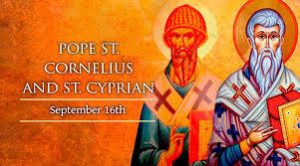HOMILY WEEK 24 01- Year II
A Eucharistic Faith that Heals:
Memorial of Saints Cornelius and Cyprian
(1 Cor 11:17-33; Ps 40; Lk 7:1-10)
*******************************************
Lord, I am not worthy that you should enter under my roof, but only say the word and my soul shall be healed.
The readings today invite us into a deeper appreciation of the Eucharist to heal our souls.
In the gospel, we are told that Jesus is in Capernaum, where a pagan, a Roman soldier, who is not only sympathetic to the Jews under the oppressive system of which he is a part, but also actually built a synagogue for the local community.
This pagan soldier stands out for other reasons as well, one being his concern for a highly valued servant who is in danger of dying. The other is his trust in Jesus, first of all sending Jewish elders to ask Jesus to heal his servant, and then, astonishingly, trusting that just the word of Jesus from a distance would heal that sick servant.
We can contrast his faith with that of another pagan person, the leper Namaan, who came to see a Jewish prophet and felt insulted when told by the prophet’s messenger to immerse himself in the Jordan. He was sure the prophet would come out himself, pray over him and heal him, thinking the rivers in his own land were more conducive to healing than the muddy, meandering Jordan. He had to be convinced to humble himself and obey the prophet, and only then experienced healing.
No wonder Jesus exclaimed that in all of Israel he had not seen such faith as that of the centurion. This incident is very significant, as I know some Catholics would judge the spiritual ceremonies of Indigenous cultures to be “pagan” and idolatry. Hopefully, to hear Jesus say here that a pagan soldier’s faith in him exceeds those in all of Israel, may soften their position a bit.
The faith of this Roman soldier, expressed through the comment that is included in the Eucharist just before we receive communion, connects us with the teaching of St. Paul in the first reading. For his part, Paul is somewhat scandalized at the way the Corinthians were celebrating the Eucharist, in a manner that was careless, uncaring and un-sharing, with some allowing others to go hungry, and others drinking an excess amount of wine, all within the context of deep divisions in the community. For Paul, this meant their celebration of the Eucharist was not the Lord’s Supper. It could not be because a Eucharist that is not lived out in practical loving ways, is not a Eucharist that has been truly celebrated.
Especially lamentable for St. Paul, and for us today, is the reality of divisions in a community when the Eucharist is meant to be a cause and sign of unity. Actually, the Eucharist when sincerely celebrated with faith is the primary sacrament of healing and reconciliation. Some would say to simply come to the Eucharist is already touching the hem of Jesus’ garment. Others would say that when the community gathers together to pray the “Our Father”, and to receive the Body and Blood of Jesus, our sins are forgiven, such is the power of God’s mercy present in the person of Jesus Christ and his sacrifice on the Cross.
 When Cornelius was elected pope during the Decian persecution (250-51), the Roman See had been vacant for many months following the martyrdom of the previous pope, Fabian. A priest name Novatian tried to usurp Cornelius’ place as bishop of Rome. Cyprian, Bishop of Carthage, supported Cornelius, his friend and ally, and the teaching of Novatian was condemned in a synod. In 253, under renewed persecution, Cornelius was arrested and banished. He died in exile the same year.
When Cornelius was elected pope during the Decian persecution (250-51), the Roman See had been vacant for many months following the martyrdom of the previous pope, Fabian. A priest name Novatian tried to usurp Cornelius’ place as bishop of Rome. Cyprian, Bishop of Carthage, supported Cornelius, his friend and ally, and the teaching of Novatian was condemned in a synod. In 253, under renewed persecution, Cornelius was arrested and banished. He died in exile the same year.
Cyprian of Carthage was an important figure of the early church. Brilliant and learned, he became a priest soon after his conversion to Christianity, and in 249 was elected bishop. When the Decian persecution began, he went into hiding and supported his flock by letters. In 257 persecution was renewed under Valerian. Cyprian, one of the first arrested, was banished. In a retrial a year later, he was condemned to death.
So, may our celebration today deepen our faith in the power of the Eucharist to both forgive and heal, and fill us with gratitude at this awesome sacramental sign of God’s boundless mercy and love, lived out by Saints Cornelius and Cyprian.



